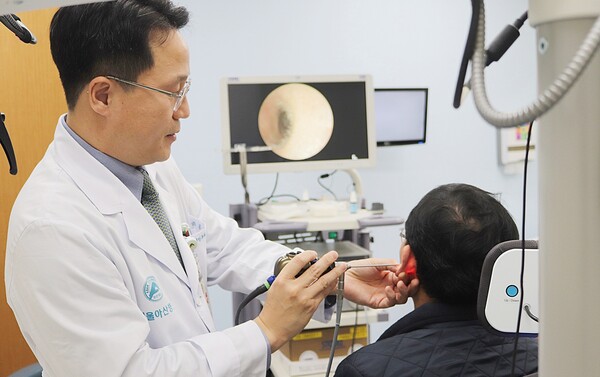"For the first time in the world," the auditory center of the brain has been shown to recover in adults with cochlear implants, as has hearing function, a major Korean hospital said.

Asan Medical Center said Thursday that a team led by Professor Park Hong-ju of the Department of Otolaryngology analyzed brain magnetic resonance imaging (MRI) scans of 16 adults with acquired deafness who underwent cochlear implant surgery in one ear and found that the volume of the cerebral cortex, which controls hearing, increased significantly compared to before implantation.
The team previously reported that patients with profound hearing loss have reduced cortical volume in many areas of the brain, including the upper temporal lobe, which is responsible for hearing and speech perception.
The new study is the first to follow structural changes in the brain in the long term after cochlear implantation. It reveals that the cortex recovers from atrophy as hearing improves with cochlear implantation.
Researchers analyzed cortical changes before and after cochlear implantation and found that the volume of the cerebral cortex, including the auditory cortex, which directly receives sound, increased significantly. The degree of cortical recovery was strongly associated with the degree of hearing recovery.
They also found that the increase in the volume of the superior temporal gyrus was strongly correlated with the improvement in word recognition after surgery, suggesting that the improvement in hearing ability is related to the recovery of the brain's auditory central structures.
“This study is significant because it directly confirmed through cerebral MR imaging that adults with acquired hearing loss can hear better with cochlear implantation and that the volume of the brain's auditory cortex can be restored,” Professor Park said.
“As we age and our hearing declines, so does our ability to recognize words, which can lead to communication difficulties,” he said. “Hearing loss can lead to dementia in the long term, so hearing aids should be the first line of defense for anyone experiencing difficulty with their life. If hearing aids are insufficient to communicate, we recommend aggressive treatment of hearing loss with cochlear implantation.”
The findings were published in the latest issue of Nature's sister journal, Scientific Reports (impact factor 3.8).

